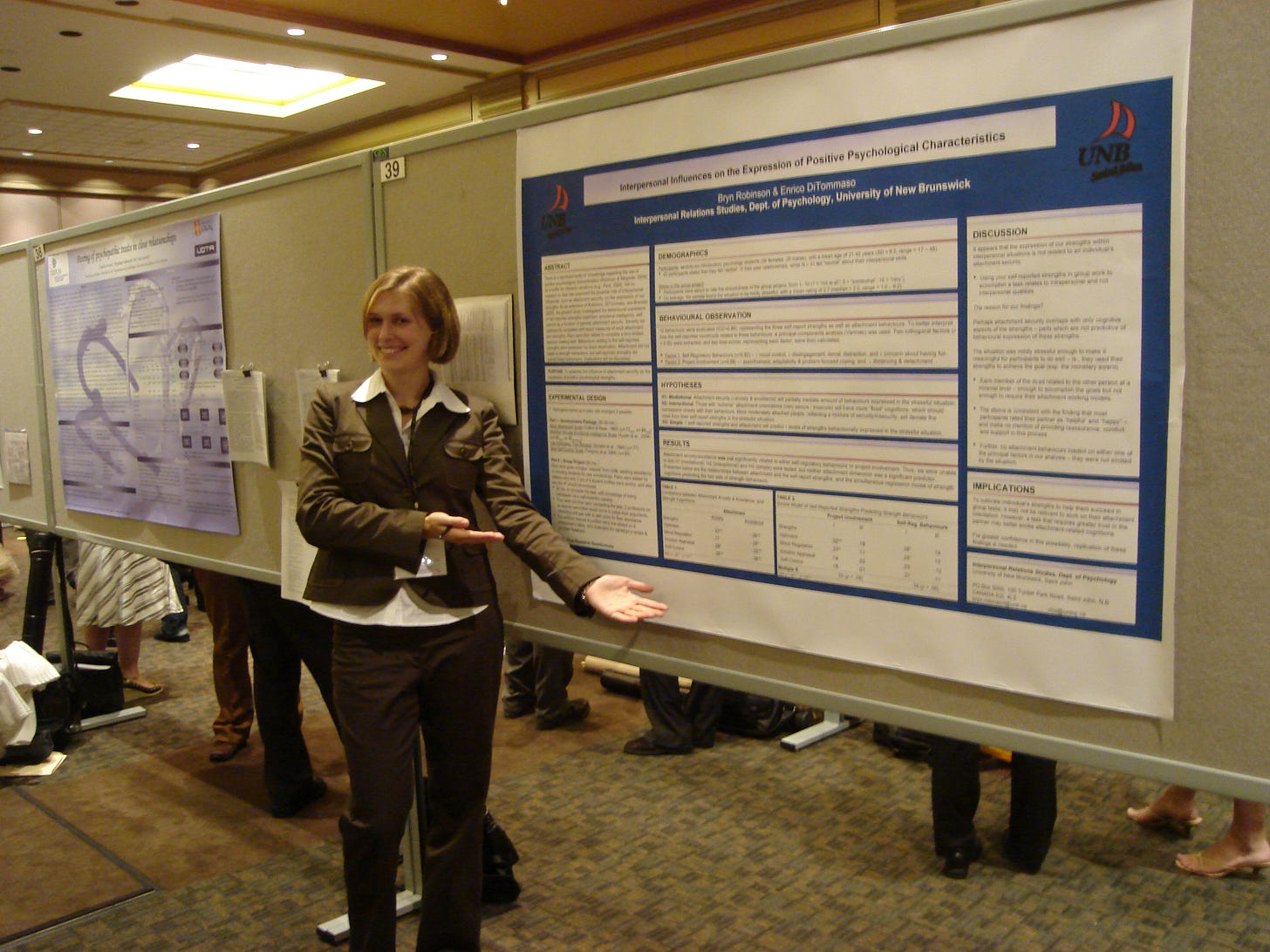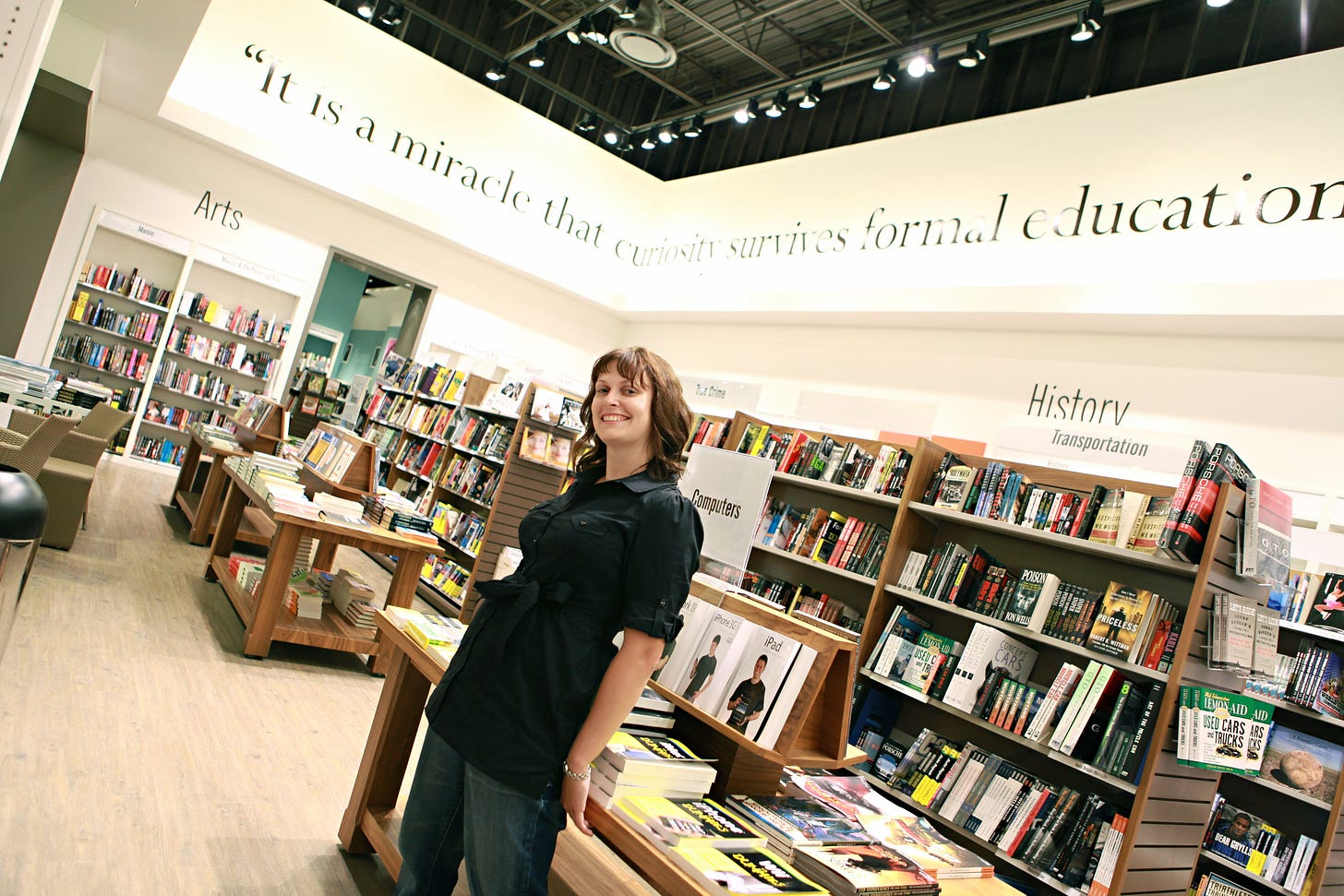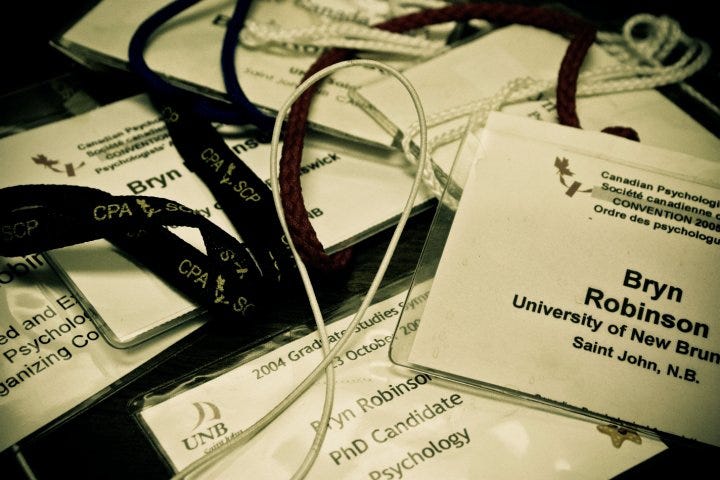It’s Monday, May 31, 2010. An amber afternoon sun pours through the tall glass windows that line one side of the standard-issue cubicle farm housing me and about a dozen other civil servants. Sitting at my desk, I try to feign interest in the policy edits on the computer screen before me, but I can’t help but think instead of the beautiful spring evening that waits for me once I escape.
The phone rings and jolts me from my post-lunch haze. I look at the number, and freeze, if only for a second, before taking a steadying breath and picking it up.
“…Hey, what are you doing on Friday?”
- “…this Friday?”
“Yes.”
- “Um, working?”
“Want to defend your dissertation instead?”
About a month earlier, I had submitted my final document to the examining committee convened by the university: my supervisor, three professors from the university (one in my home department of psychology, and two in other departments), and an external examiner from another university who had familiarity with the subject matter. I had a near-final presentation ready, and an annotated copy of my dissertation in preparation for the questioning.
So while it shouldn’t have been a complete surprise, my supervisor’s phone call was still unexpected; you usually get at least a couple weeks’ notice. The rush here was just the way it worked with aligning five profs’ schedules before it became impossible with the traditionally busy academic summer of conferences, experiments, and, yes, vacations.
So, Friday it was.
Timing is Everything
Nearly six years earlier, I walked back onto the university campus after a year away. I worked two part-time jobs and did a bit of travelling, and throughout it all, marinated in the idea of going to grad school. I wanted to make sure going back to university was a good idea, especially where the only certainty I knew was that I didn't want to be a professor.

Looking back, I’m surprised they let me in. If I was asked, I was usually honest about enjoying research, but wanting to have breadth over depth. The ability to apply skills in new areas would satiate my well of curiosity far better than the typical deep specialization that grad school is usually for. There were far fewer discussions (and resources) out there about non-academic paths than there is now, and limited mentorship and support.1
There was also an unpopular stance that I was going to do my second degree in the same place as my first degree. Not just the same university - the same department and supervisor as my undergraduate honours thesis.
There’s a school of thought that you limit your development by staying in the same pond2, but in my mind, that was irrelevant. It was 2004, and while the ashes of Netscape and GeoCities were still smouldering, a serviceable Internet did exist. That is, I could still engage with ideas and others in virtual spaces, and my research - emerging adults’ mental health - didn’t exactly require a large particle collider.
And I was am a practical person. My supervisor and I got on well. As I progressed, he resigned himself to my non-academic ways and sent me numerous opportunities to diversify my skill set (consulting on research design for outside professionals; data collection and analysis). He wasn’t a micro manager.
I had done one degree with no loans, and I wanted to keep it that way for this one for as long as possible.3
Are You Ready for This?
Two days before my defense, I head to the university and run through my presentation with my supervisor. We discuss possible questions, and make slide adjustments. I head home, trying to remind myself that they wouldn’t let me get to this point if I wasn’t ready.
How does grad school even get you “ready”? The whole experience is greater than the sum of the parts. In the early years, these parts are very similar to an undergraduate degree. I had classes in statistics, methodology, ethics, and roundtable seminars on special topics, like perception, personality, and the evolution of psychology as a science.
As Year 1 becomes Year 2, then 3, I spent less and less time in the classroom, and more in research. I designed and ran studies. I went to conferences and shared my science.

I also had to apprentice as a teacher4, which was sometimes fun, but did confirm to me that I didn’t want to teach all the time. I’m grateful for that insight.
Finally, before I dove into the dissertation proper, I had to complete a “comprehensive project” - basically, a piece of work not in my thesis area. I did an ethics paper on whether countertransference (when therapists share their feelings back with clients) was ever valid. Perhaps more importantly, I got schooled by my project supervisor in being a better writer. It’s forever a highlight of my grad school experience.
Slaying the Beast
Finally, the big show. Proposing the research, then conducting the studies and writing up the results, took about two, two and a half years.
I remember times when I was so tired. So frustrated. I wanted to quit more than once.
What kept me going? My dad listened, and then told me to keep going, even more times. I’d remind myself that I needed the degree for those non-academic types of jobs in industry or government that interested me. I’d remind myself, too, that I would not be okay stopping short, always wondering, “What if…?” To add gasoline to the motivation fire, in full disclosure, my relationship of six years ended in a spectacular blaze of glory.
This Type-A, Lisa Simpson science nerd was now also suddenly a single cat parent in a shitty new apartment and an unfinished dissertation, but with so much love and support elsewhere.
And it all combined in a perfectly messy storm to prove it to myself and push me over the finish line.
Slaying the Beast
Friday, June 4, 2010. I sit in my office at the university, looking over notes but mostly jamming out to music, waiting for my supports to arrive: my dad, my sister Teri, my friend Heidi (who thankfully took a few photos of the occasion while I was internally screaming).
By late morning, I’m back in my office, waiting with my crew for my supervisor. He comes after a short time, and I’m welcomed back into the room as Doctor.
Just like that.
And just like that, it’s been 12 years since that sunny June day. Twice as much time has now passed than the time I was in school. What seemed interminable and insurmountable at times has breezed by post-university. I’m working in the mythical non-academic job that lets me be applied and geek out sharing science, and it’s constantly evolving. I’ve found my unique voice, and in the end, I think that’s the biggest gift that grad school gave me.
So, yes, going back to university turned out to be a good idea.
Now that I think of it, I’m surprised I let myself continue.
A rather privileged position that at least one of my professors would share with me on more than one occasion. As if I’d jump on the next plane to wherever.
Spoiler alert/humblebrag: A small line of credit, but no student loans.
The two teaching apprenticeships involve you first shadowing a prof, then teaching a whole course by yourself with minimal supervision. Which would be fine but you pay tuition still, and you don’t get paid. Ain’t that something?











Defenses do feel dramatic, I think in part because they're the final step. But they also bring together people who are smart and who often (usually) don't see things the same way. What ends up being tested is interaction. Sometimes at least. A sort of glorified and narrowed oral prelim. At the end of my graduate school experience, which was overall pretty good, I felt like I should have been awarded an honorary doctorate in political science. Sounds like you had good support and encouragement.
But, you know, it's reassuring to know that you know more than anyone else in the room on your topic....
Nice story, Bryn! We definitely share a similar path through the PhD ... I knew I didn’t want to stay in academia (I would have called it “get stuck in academia”) and I recall my advisor’s husband (also a history prof) looking at me and saying, “But what in the world will you do?” I told him that I thought there were other ways to combine writing and analysis than in the university, and it turned out there were, thank goodness. Anyway, I liked your post a lot and may decide to tell my version of this story, including my “face off” with one irascible old prof.